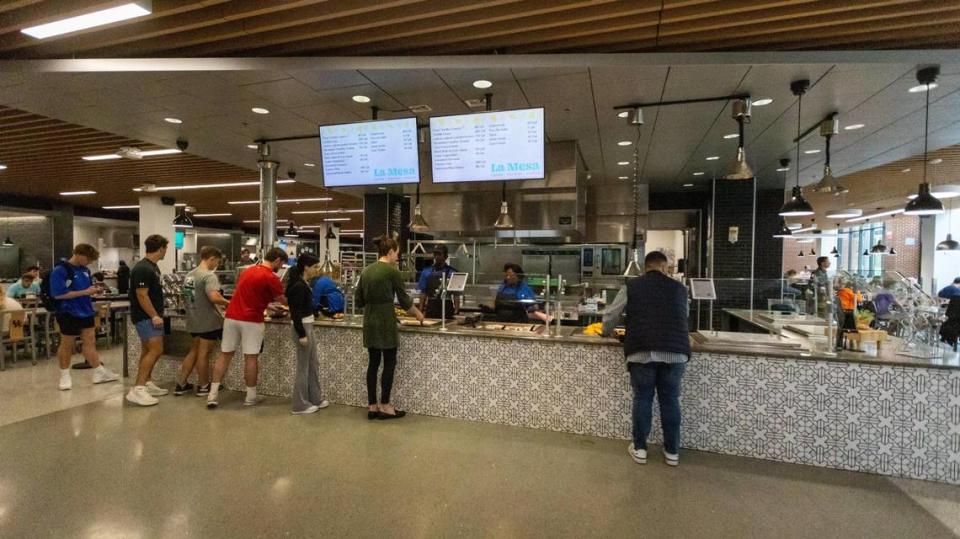UK used more local businesses, farms for on-campus dining in 2023, report shows
Ten years ago, the University of Kentucky entered into a contract with Aramark committing to serving local food on campus. When a study found that most of the local products were soda and ice, the university began looking at new ways to bring Kentucky-sourced food to campus.
The goal was to source 20% of its food from local vendors by 2023. A new report found that UK has far exceeded that goal in the last year. UK spent $8.2 million on Kentucky farm and business purchases in the 2023 fiscal year, nearly four times its planned commitment to local food sources, according to the 2023 dining report from The Food Connection, a center in the College of Agriculture, Food and Environment.
“This report marks an important shift for UK Dining — prioritizing purchasing food from independently owned farms and food businesses, as opposed to relying heavily on sourcing farm impact products only from large Kentucky-based processors and/or large Kentucky-based publicly traded farms and/or food businesses,” said Ashton Potter Wright, executive director of The Food Connection.
UK spent $1.2 million of that $8.2 million on food sourced from Kentucky farms, the first time since the COVID-19 pandemic that spending on food from local farms has topped $1 million. In total, there has been more than $18 million invested in Kentucky farms and businesses since the contract took effect in 2014, UK said.
Rebounding from COVID has presented several challenges for locally-sourced food, Potter Wright said. For example, finding locally grown lettuce has been a challenge because the previous suppliers were all small farms who no longer sell lettuce wholesale, she said.
The contract with Aramark, UK’s food service partner, has benchmarks for purchasing from local food sources. Those benchmarks increase each year. Those goals require Aramark and UK to source food from both Kentucky farms and Kentucky food businesses. UK Dining spending on local products and businesses increased 9% compared to last year, according to the recent report.
Kentucky food-based business purchases come from places like Prairie Farms Dairy or Klosterman Baking Company, where food products are produced in the state.
“In Kentucky, agriculture is a way of life. Access to locally sourced and produced food remains a central issue for Kentuckians and the world,” said UK President Eli Capilouto. “At the University of Kentucky, we are continuing to lead the way for Kentucky producers. This report further highlights our commitment to growing locally to serve our state as we work to advance the Commonwealth.”
Thousands of students and UK employees eat on campus every day. A commitment to local farms, foods and businesses helps the state economy. For local farmers and vendors, working with UK gives them a steady income source, while also exposing their products to a younger generation of consumers, Potter Wright said.
“They’re building a new customer base, a new generation of eaters,” Potter Wright said. “We have thousands of kids on campus, and as dining is promoting those farms on their menus, in the dining halls, then those students are more likely to seek those products out when they’re doing their own shopping.”
The largest category of spending is protein, including beef, pork and chicken, on which UK spent $550,556. But there has also been a decrease in the purchasing of whole beef in the last year, as students on campus are eating less meat, Potter Wright said. Another large area of spending is dairy, where UK spent $238,848.
There have been creative ways to bring more Kentucky-grown products to campus, too. One way is by creating a “Kentucky tortilla chip,” made with corn grown in Fayette County. The university also works with Custom Food Solutions in Louisville to process Kentucky-grown products, like tomatoes, into soups and sauces that can be used on campus, Potter Wright said.
While UK’s purchasing impacts the state economy, “the commitment and the consistency” of sourcing to the state’s largest university also helps local businesses and farms plan their businesses, Potter Wright said.
“It’s not just a one-off,” Potter Wright said. “UK is looking to develop sustainable partnerships.”
Steven Clem, sales manager of Clem’s Refrigerated Foods, said working with UK has given them consistent business over several years. Located less than a mile from UK on Virginia Avenue, Clem’s sources protein for UK. Clem said working with the university and Aramark has been “a tremendous relationship.”
“It’s been really good because it’s consistent business that you know is going to be there,” Clem said. “The contract they signed (with Aramark) is for 20 years, and it continues to increase, so you know its goals that UK wants to hit and it gives us the opportunity to basically grow with them.”
Ford Waterstrat, owner of Sustainable Harvest Farm in London, has been selling produce to UK for several years. Waterstat said it’s great to see UK supporting local farms, especially since the university has a large agriculture department.
“It’s exciting to see a university investing in local agriculture,” Waterstrat said. “I think it’s just cool to be able to think that the support is there, and the interest is there.”
Sustainable Harvest Farm sells product to grocery stores like Walmart, Kroger and Whole Foods. Working with UK helps to bring more local produce to more people in Kentucky, he said.
“Local farmers, if given the opportunity, can feed the world with a lot of great stuff,” Waterstrat said.



